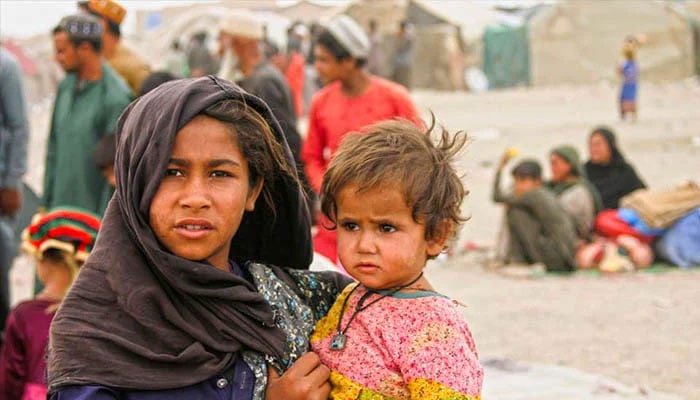Economic reality
LAHORE: The Pakistan Economic Survey 2023-24 is silent on current poverty figures in Pakistan. It did highlight the billions of non-conditional cash transfers to the poor through various programmes which are not sufficient to cover the estimated 40 per cent of Pakistanis living below poverty line.
The survey also revealed that public health expenditure in the country is only 1 per cent of the GDP. The infant mortality rate of 52.1 per 1000 births indicates that more funds are needed in the health sector. The allocations for education at 1.5 per cent of GDP is among the lowest in the region, particularly when there are over 2.5 million children out of school.
The survey also revealed that Pakistan has been excluded from this year’s World Bank’s Logistic Performance Index of 139 countries, merely because the data needed for evaluation was not provided by the government.
The last time Pakistan figured in the LPI was about five years back when the country was ranked 122 out of 160 countries. This index gives a glimpse of the facilities or hurdles in logistics faced by businesses in transportation and clearance of goods. The LPI also points out the number of documents required by customs at the time of import and export of goods.
The time of clearance of shipment is also documented as it shows the efficiencies and automation in any system. Efficient LPI drastically reduces cost of doing business and import trade.
The growth in agriculture has saved the day for Pakistan but the production of sugarcane and maize declined.
Both these crops contributed to agricultural exports, with rice accounting for $2.9 billion in exports during July-March FY2024. Pakistan needs to increase the growth in these two export crops.
Wheat was no doubt a success story, but the way farmers suffered in disposing of their crops would discourage them from sowing this crop next year.
After the finance minister hinted at dropping the support prices for wheat, farmers will from now on go for crops that could be disposed of easily in the market.
Of the four main sectors that are preferred for track and trace systems, two are from the agriculture sector of which tobacco is at the top followed by sugar. Government has succumbed to the politically strong sugar lobby by allowing export of sugar.
The sugar mills while seeking permission to export always pledge that exports would not impact the supply and sugar rates in Pakistan. But every time the public paid higher prices after exports were executed. Let us see what happens this time. The government should also ensure that the growers are paid for sugarcane by the sugar mills in time. The payment under law has to be made within a fortnight of procurement but also 70 percent of the payment to sugarcane farmers is made 5-6 months later. The sugar mills blackmail the government that if sugar exports are not allowed they would not be able to pay last year’s dues.
As the government pulls out of market interventions in crops we might see farmers of other crops as vulnerable as sugar farmers are these days.
This call for strict regulation by the government that ensures payment of farmers on crops within 15 days.
-
 Why Travis Kelce Says Taylor Swift Has Made Him 'so Much Better'?
Why Travis Kelce Says Taylor Swift Has Made Him 'so Much Better'? -
 Halle Berry Credits This Hairstyle With Launching Her Acting Career
Halle Berry Credits This Hairstyle With Launching Her Acting Career -
 Hailee Steinfeld Spills Her 'no-phone' Rule With Husband Josh Allen
Hailee Steinfeld Spills Her 'no-phone' Rule With Husband Josh Allen -
 Bowen Yang Gets Honest About Post SNL Life: 'It’s An Adjustment'
Bowen Yang Gets Honest About Post SNL Life: 'It’s An Adjustment' -
 Charlize Theron Delivers Strong Message At 2026 Winter Olympics Opening Ceremony
Charlize Theron Delivers Strong Message At 2026 Winter Olympics Opening Ceremony -
 Lil Jon Reacts To Son Nathan Smith's Death: 'Devastated'
Lil Jon Reacts To Son Nathan Smith's Death: 'Devastated' -
 Bianca Censori Reveals Where She And Kanye West Stand On Having Children Together
Bianca Censori Reveals Where She And Kanye West Stand On Having Children Together -
 Taylor Swift Hypes Olympic Athletes In Surprise Video Message
Taylor Swift Hypes Olympic Athletes In Surprise Video Message -
 Timothy Busfield Charged With Four Counts Of Child Sexual Abuse
Timothy Busfield Charged With Four Counts Of Child Sexual Abuse -
 Amy Schumer Explains Why Her Sudden Photo Surge Is ‘not A Cry For Help’
Amy Schumer Explains Why Her Sudden Photo Surge Is ‘not A Cry For Help’ -
 Kanye West First Contacted Bianca Censori While In Marriage To Kim Kardashian?
Kanye West First Contacted Bianca Censori While In Marriage To Kim Kardashian? -
 Travis Kelce Reveals What His Nieces Really Do When He, Taylor Swift Visit
Travis Kelce Reveals What His Nieces Really Do When He, Taylor Swift Visit -
 Lola Young Makes Career Announcement After Stepping Back From Touring
Lola Young Makes Career Announcement After Stepping Back From Touring -
 Priyanka Chopra Shares Heartfelt Message For Nick Jonas
Priyanka Chopra Shares Heartfelt Message For Nick Jonas -
 Spotify, Major Labels File $13b Lawsuit Over Alleged Music Scraping
Spotify, Major Labels File $13b Lawsuit Over Alleged Music Scraping -
 Travis Kelce Opens Up About Being Backup Plan For His Nieces
Travis Kelce Opens Up About Being Backup Plan For His Nieces




